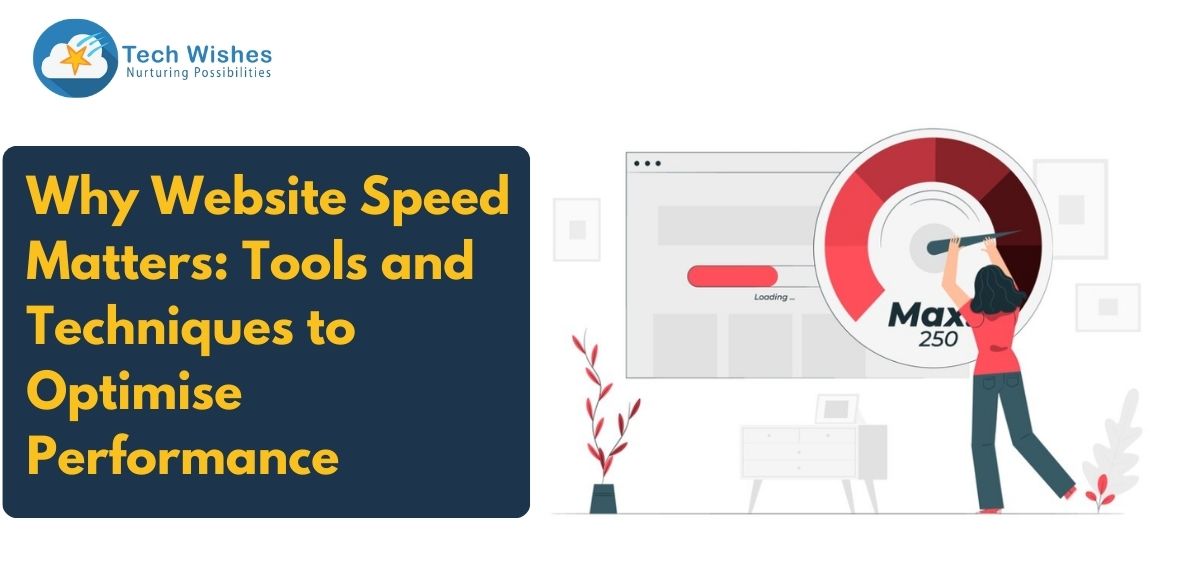
Why Website Speed Matters: Tools and Techniques to Optimise Performance
In 2024, a website’s speed can make or break your online success. Slow websites are no longer just an inconvenience—our web developers in Kolkata say they can harm your reputation, reduce traffic, and cripple sales. Website speed affects everything from how users experience your site to how well it ranks in search engines. As a business, ignoring website performance can lead to missed opportunities, lower SEO rankings, and decreased customer satisfaction.
Why Website Speed Matters
Website speed isn't just about how fast a page loads—it’s about the overall user experience, how it affects your SEO rankings and its impact on your bottom line. Here are some key reasons why you should focus on optimising your website’s speed:
User Experience
Research shows that 53% of mobile users abandon a site that takes longer than three seconds to load. Today’s users have short attention spans, and a slow website can cause frustration, leading them to exit and seek alternatives. A fast-loading website makes for a more enjoyable user experience, increasing the time visitors spend on your site, which can boost engagement, reduce bounce rates, and lead to more conversions.
SEO Rankings
Google has made it clear that website speed is a crucial ranking factor. Websites that load faster are more likely to rank higher on search engine results pages (SERPs). Search engines like Google reward fast-loading websites with better visibility, which is crucial for attracting organic traffic. Our SEO experts in Kolkata say that if your website is slow, you risk losing out on valuable search engine rankings, which directly impact your site’s visibility.
Conversions & Revenue
The correlation between website speed and conversions is undeniable. A study by Akamai revealed that a 100-millisecond delay in page load time can reduce conversion rates by 7%. For e-commerce sites, that means fewer sales. Whether you’re selling products, and services, or generating leads, faster websites are more likely to drive conversions, leading to more revenue. A faster site also improves user trust, which is critical for sales and customer retention.
Tools and Techniques to Optimise Website Performance
Optimising website performance doesn’t have to be overwhelming suggests our website developer in Kolkata. Several tools and techniques can drastically improve your site’s loading time. Here are some of the most effective methods:
Image Optimization
Images are often the largest files on a webpage and can significantly slow down load times. Website designers in Kolkata say compressing images without sacrificing quality is essential. Tools like TinyPNG, ImageOptim, and ShortPixel reduce image file sizes, which decreases the overall load time. You can also consider using next-gen image formats like WebP to further enhance speed.
Minimise HTTP Requests
Every time a browser loads a webpage, it makes multiple HTTP requests to retrieve files like images, scripts, and CSS. The more requests your site makes, the slower it loads. Reducing the number of requests by combining CSS files, minimising JavaScript, and using CSS sprites for icons can significantly improve load times.
Enable Browser Caching
Caching allows browsers to store static files like images, CSS, and JavaScript so that they don’t have to be reloaded every time a visitor returns to your site. Enabling browser caching can drastically reduce load times for repeat visitors, providing a smoother user experience.
Use a Content Delivery Network (CDN)
A Content Delivery Network (CDN) stores copies of your site’s content on servers around the world. When a user visits your site, the CDN delivers the content from the server closest to them, improving load times and reducing latency. Popular CDN providers include Cloudflare, Amazon CloudFront, and Akamai.
Lazy Loading
Lazy loading is a technique where images and videos are only loaded as they appear in the user’s viewport. This reduces the initial load time, allowing the most important parts of the page to load faster. Lazy loading ensures that content below the fold doesn’t slow down the rest of the site.
At Tech Wishes, the best website development company in Kolkata we specialise in optimising websites for speed and performance.
If you want to improve your website’s speed or overall performance, our team of experts is ready to help.
Don’t let a slow website stand in the way of your business’s success.
FAQs
Why is website speed optimization important?
Website speed is crucial because it affects user experience, SEO rankings, and conversion rates. Faster websites provide a better experience for users, rank higher on search engines, and drive more sales and leads.
How would you optimise the performance of a website?
You can optimise performance by compressing images, minimising HTTP requests, enabling browser caching, using a CDN, implementing lazy loading, and minifying code. Using fast hosting is also critical for maintaining performance.
How does Internet speed affect website performance?
While website speed is largely determined by the server and the website’s optimization, the end-user’s internet speed can affect how quickly the website loads for them. Slower internet speeds may result in longer load times, even on a well-optimised site.
What is a good performance speed for a website?
A good website performance speed is around 1-2 seconds. Anything over 3 seconds can lead to higher bounce rates and reduced user satisfaction. Google recommends aiming for a page load time of less than 2.5 seconds.
Does site speed matter?
Yes, our SEO consultants in Kolkata suggest that site speed matters a great deal. It affects user experience, search engine rankings, and conversion rates. Faster websites are more likely to retain visitors, rank higher in search results, and lead to better business outcomes.